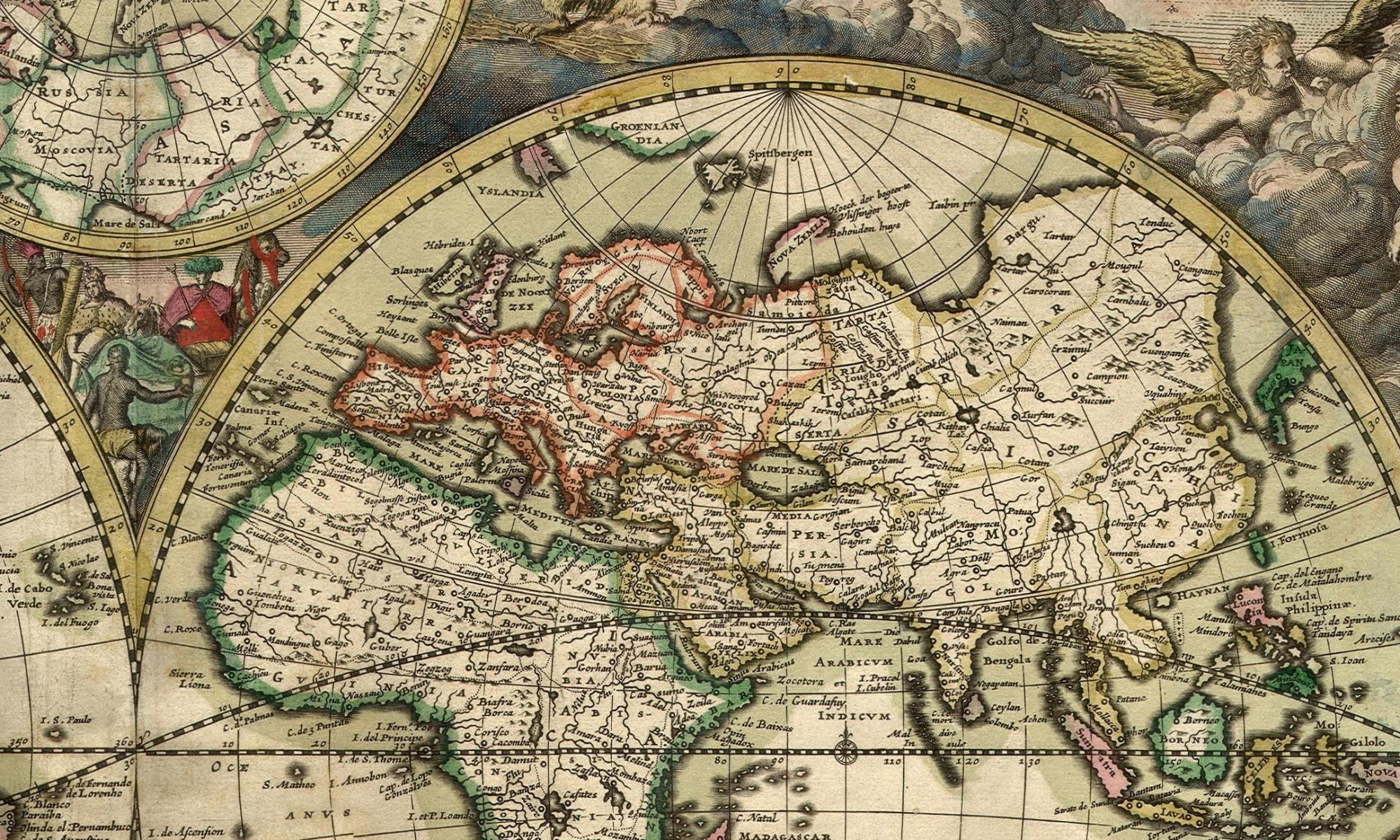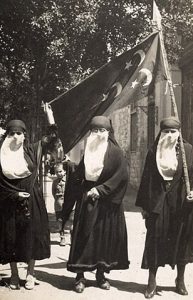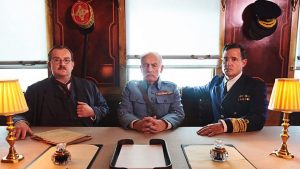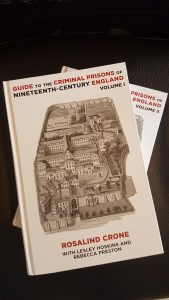The Trustees of the Rothschild Archive have awarded Dr. John Slight, Lecturer in Modern History, a Rothschild Bursary to facilitate his research in the Rothschild Archive in the City of London and the Archives Nationales du Monde du Travail, Roubaix, France, for a journal article on the Rothschilds and the 1882 British occupation of Egypt.
John Slight’s OpenLearn articles on The First World War and its aftermath
Dr. John Slight, Lecturer in Modern History, has published three articles on OpenLearn related to the First World War and its aftermath in the Middle East.
The first article examines the British ‘dash’ for Mosul, Northern Iraq, in November 1918.
The second article explores the fall of Medina, in Arabia, in January 1919.
The third article covers the Egyptian Revolution of 1919.
Annika Mombauer features in BBC Two’s WW1: The Final Hours
On 8 November 1918, an Englishman, a Frenchman and a German gathered in secret, on a train carriage in a forest near Paris. Their meeting would last for three days. Its aim: bring peace to Europe, and an end to four long years of brutal and deadly war. One hundred years after the end of the First World War, this new 60-minute documentary uncovers the extraordinary events leading up to the Armistice negotiations, and the repercussions that would ripple across the continent, and throughout the 20th century. Now, leading historians including our Professor of European History, Annika Mombauer, have examined the meeting from the perspectives of the three key players on the train, as well as the people who sent them there. Each had the weight of their nation on their shoulders. Admiral Rosslyn Wemyss joined the Navy at just 13, and grew up to be the commander of the most powerful navy on earth. Britain had ruled the waves for over 100 years, and Wemyss has been sent to the meeting with one objective; keep it that way. He had to make sure that the negotiations not only gave Britain the upper hand at sea, but ensured that Germany never threaten Britain’s naval dominance again – whatever the cost. Marshall Ferdinand Foch was in charge of the war on land. He had seen his beloved France decimated by a war of attrition which had cost millions of lives, on a front line which never moved more than a few miles. He was single-minded and unapologetic in his aim: dismantle Germany and prevent them from ever invading France again. German Matthias Erzberger was, unlike his French and British counterparts, not a military man, but a politician. Sent to negotiate for a nation on its knees, he had little room for manoeuvre, but still faced harsher terms than he had ever expected. While fighting his corner in the train carriage, events in Germany were unfolding faster than he could possibly imagine. This programme follows the meeting, and its consequences – not only for the individuals on the train, but the countries they represented. This is the story of the end of one World War, and the beginning of another.
The documentary airs on BBC Two on Thursday 8 November at 9pm.
New FREE OpenLearn course on The First World War: trauma and memory
The First World War was a war of unprecedented scale and brutality, with countless casualties. It also left a poisonous legacy for the twentieth century and beyond, and many of the issues that were left unresolved in 1918 would lead to another world war in 1939. 1914-1918 was a period in history that has proved provocative and culturally resonant for the last hundred years. In this free online course, The First World War: trauma and memory, you can study the subject of physical and mental trauma, its treatments and its representation. The focus is not only on the trauma experienced by combatants but also the effects of the First World War on civilian populations. Over three weeks, students will discover just how devastating the effects of the First World War were in terms of casualties across the many combatant nations, and look in depth at the problem of ‘shell shock’ and how deeply it affected the lives of those who lived through it. Students will also develop the skills to carry out your own independent research. However, the war was not only experienced on the battlefield. Students will explore the many and varied ways in which the war impacted on civilians, including the way combatant casualties affected the lives of loved ones who were left behind. Finally, students will look at how the trauma of the war has been depicted in art and literature, and see what has been learned from the past in the modern day treatment of combat stress reactions and post-traumatic stress disorder (PTSD). This course is aimed at anyone with an interest in the First World War. Some prior knowledge of the history involved may be helpful in understanding the context of some elements of the course, but is not necessary. By enrolling on the course students can track their progress and gain a Statement of Participation for completing the whole course. The course was written by Prof. Annika Mombauer and Dr. Vincent Trott.

Annika Mombauer’s OpenLearn article on Matthias Erzberger
Annika Mombauer, Professor of European History, has published an article on OpenLearn on on the fate of Matthias Erzberger, the most hated man in post-war Germany
Erzberger concluded the Armistice of 11 November 1918 on behalf of Germany with the Allied powers.
Richard Marsden’s piece in The Conversation on Game of Thrones and visions of the Middle Ages
Dr. Richard Marsden, Lecturer and Staff Tutor in History, has published a piece in The Conversation on Game of Thrones: imagined world combines romantic and grotesque visions of Middle Ages.
The article explores how the hit fantasy-drama series draws on romantic and grotesque perceptions of the medieval period, arguing that while the series illuminates little about the past, it reveals much about how we imagine that past.
Neil Younger’s article asks how Protestant was the Elizabethan regime?
Lecturer in History Dr. Neil Younger has published How Protestant was the Elizabethan regime? in the English Historical Review. Recent historiography on the Elizabethan regime has argued that it was strongly dominated by convinced Protestants, most prominently Lord Burghley, the earl of Leicester and Sir Francis Walsingham. This article argues that this consensus glosses over many important political figures whose religion was much more conservative, who were often sympathetic to Catholics and in several cases were probably essentially Catholic themselves. These individuals, although prominent at the time, have been seriously neglected by historians, often because of the nature of the archival record. The article surveys the prominence of such men throughout the reign, examining their religious inclinations. It goes on to assess the extent of their influence on the politics of the period, arguing that they were capable of mounting major political initiatives, and indeed scored several important successes against more strongly Protestant policies. Likewise, it argues that very often forward Protestant policies met with failure, in which the conservatives’ influence can often be detected. Finally, it discusses some of the consequences of these findings, proposing a more complex picture of Elizabethan politics, in which religious division and indeed conflict was a significant factor, and arguing that the Elizabethan regime should therefore be seen as a much less united and univocal entity than is often assumed.
Rosalind Crone’s book on the Criminal Prisons of Nineteenth Century England
Senior Lecturer in History Dr. Rosalind Crone has published a Guide to the Criminal Prisons of Nineteenth Century England.
The penal system in nineteenth-century England was incredibly complicated. It comprised two types of prison: convict prisons and local prisons. While convict prisons were under the direct control of the Home Office, local prisons were, until the 1877 Prison Act, managed by a whole host of different local authorities, from counties and boroughs to liberties and even cathedrals. Moreover, included among convict prisons were penitentiaries, public works prisons and prison hulks (also known as floating prisons), while local prisons included gaols, bridewells and lock-ups. This complexity has led to a raft of studies of individual institutions. Nevertheless, big gaps in our knowledge remain. Simply put, we don’t even know how many prisons existed in nineteenth-century England. This Guide to the Criminal Prisons of Nineteenth-Century England recovers much of that lost landscape. It contains critical information about operational dates, locations, jurisdictions, population statistics, appearances in primary and secondary sources and lists of surviving archives for 844 English prisons-including local prisons (419), convict prisons (17), prison hulks (30) and lock-ups (378)-used to confine those accused and convicted of crime in the period 1800-1899. Furthermore, through analysis of the accumulated data, the book challenges several important assumptions on the emergence of the modern prison in Britain. It also draws attention to previously unexplored patterns in the preservation and management of penal records.
Paul Lawrence’s article in Criminology and Criminal Justice
Professor Paul Lawrence has published Historical criminology and the explanatory power of the past in Criminology and Criminal Justice. To what extent can the past ‘explain’ the present? This deceptively simple question lies at the heart of historical criminology (research which incorporates historical primary sources while addressing present-day debates and practices in the criminal justice field). This article seeks first to categorize the ways in which criminologists have used historical data thus far, arguing that they are most commonly deployed to ‘problematize’ the contemporary rather than to ‘explain’ it. The article then interrogates the reticence of criminologists to attribute explicative power in relation to the present to historical data. Finally, it proposes the adoption of long time-frame historical research methods, outlining three advantages which would accrue from this: the identification and analysis of historical continuities; a more nuanced, shared understanding of micro/macro change over time in relation to criminal justice; and a method for identifying and analysing instances of historical recurrence, particularly in perceptions and discourses around crime and justice.
Migration in colonial Africa and Asia Ferguson Centre event
On 2 July 2018 we held a very successful workshop on Colonial migration in Africa and Asia: historical connections and comparisons, organized by the Ferguson Centre for African and Asian Studies.
Migration is one of the foundational pillars of the story of humanity. The study of migration has been energised in recent decades by new sources and frameworks such as transnational history and diaspora studies. Migration is a topic that engages the attention of scholars in numerous disciplines, including history, human geography, development and literature. Understanding migration in its myriad forms has an urgent contemporary relevance in light of current migration movements driven by factors such as conflict (inter-state, intra-state, and non-state), labour demands in a globalised world, and climate change. By bringing together scholars working on historical migration in sub-Saharan Africa, the Middle East and Southeast Asia during the colonial period, the event enabled area studies specialists who practice transnational history to engage in a productive intellectual dialogue with each other and attendees. The event aims to bridge the gap between scholars of Africa and Asia, and enable historical perspectives to inform research in other disciplines.



